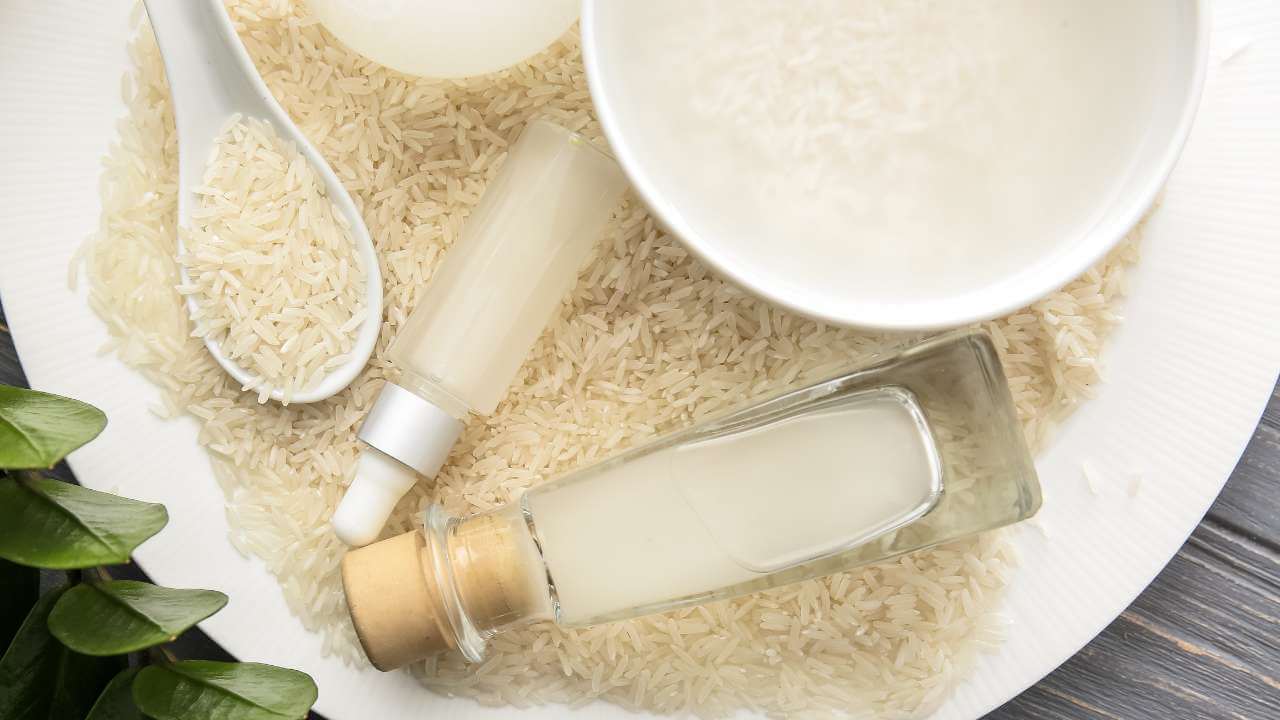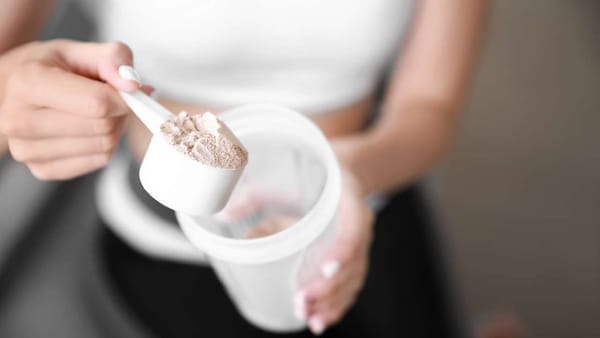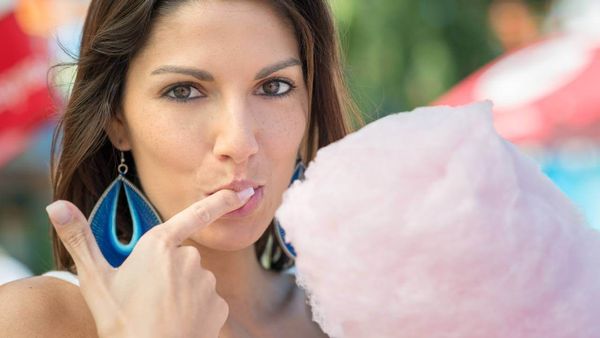What is Rice Water | Benefits | How to Prepare | How to Use | FAQ | The Final Mention
Are you tired of spending money on expensive skincare products that promise to give you flawless, glowing skin? Do you want to know the secret to achieving healthy, supple skin without breaking the bank?
Look no further than your kitchen cabinet! Rice water, the starchy leftover water from rinsing rice, has been used for centuries in Asian skin care routines for its numerous benefits for the skin.
In this article, we'll explore the many benefits of rice water for skin, plus you'll also learn how to incorporate fermented rice water into your skincare routine and discover simple DIY rice water treatments you can make at home.
If you're ready to achieve healthy, radiant skin without breaking the bank, keep reading to learn more about the amazing benefits of rice water for your skin!
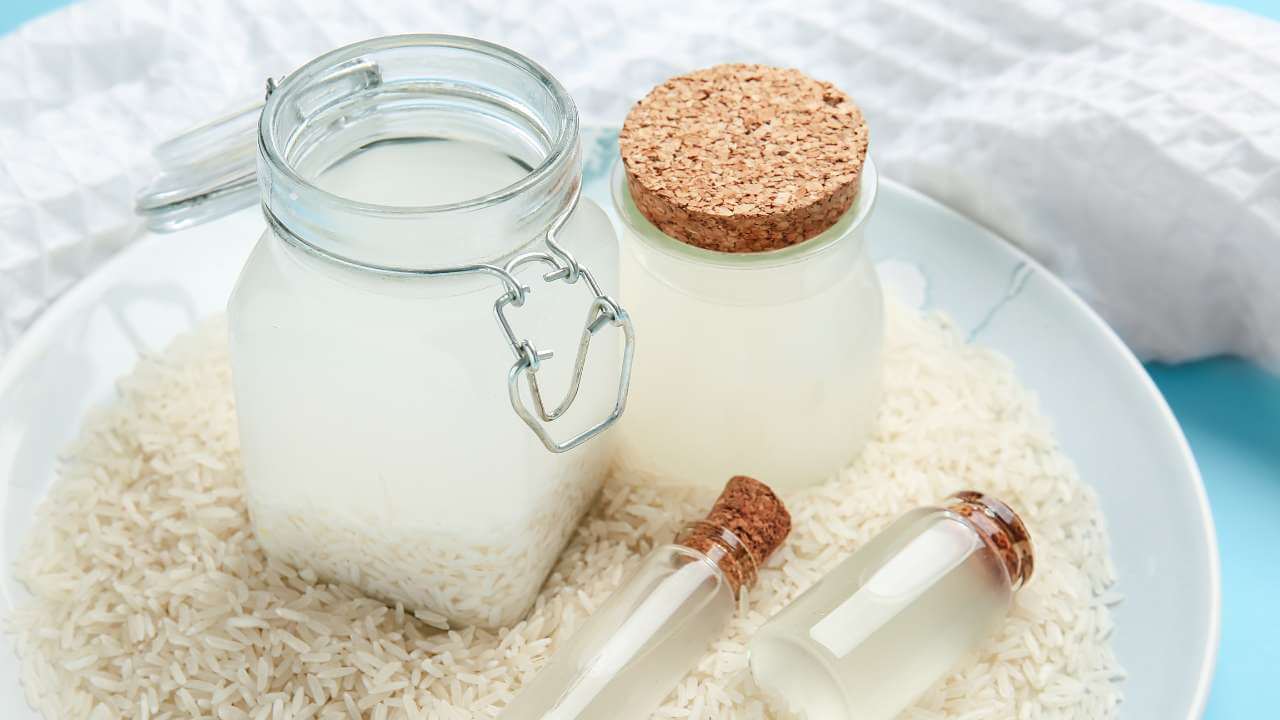
What is Rice Water?
Rice water is the starchy water left over after soaking or rinsing rice. It is a traditional beauty treatment that has been used for centuries in Asia to improve the health and appearance of the skin and damaged hair.
Rice water contains various beneficial nutrients and vitamins, such as antioxidants, amino acids, and B vitamins, that can nourish and protect the skin's natural barrier.
Now let's take a look at the benefits of rice water for skin.
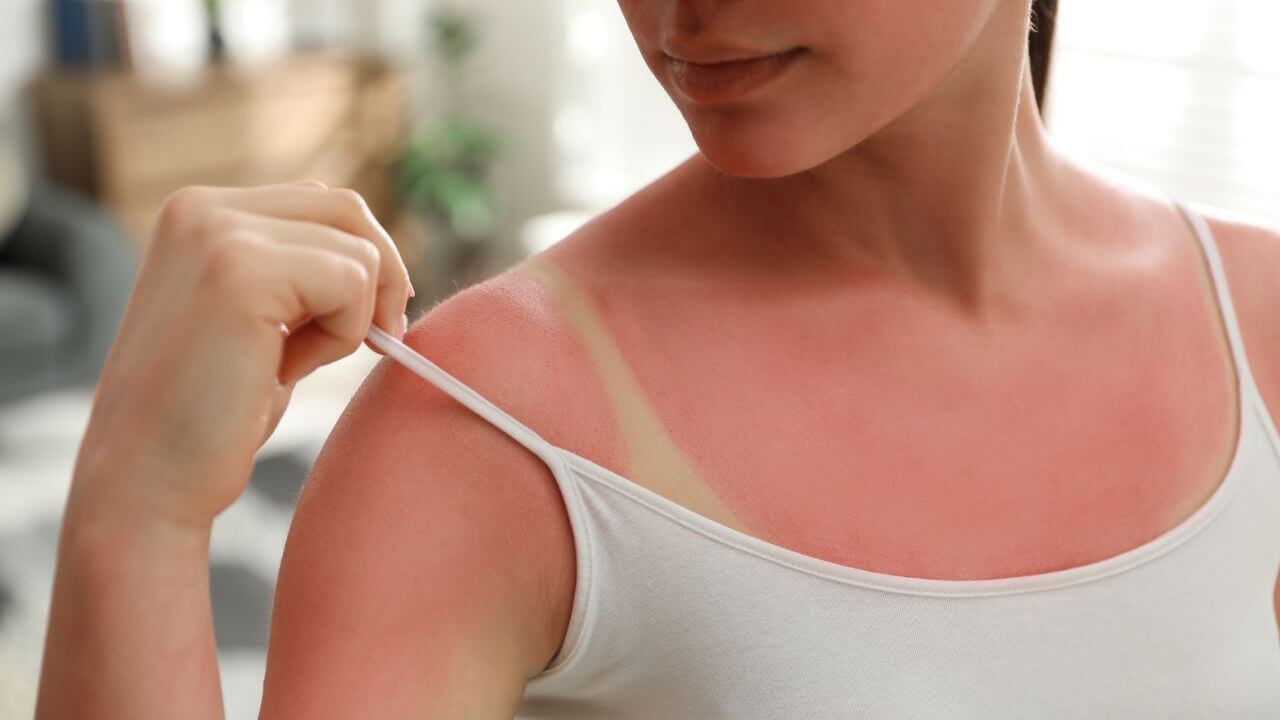
Benefits of Rice Water for Skin
1) Used for Skin Brightening
Rice water is rich in antioxidants and amino acids, making it an excellent natural skin lightener. The antioxidant properties of rice water can help fade dark spots and other types of hyperpigmentation, resulting in a brighter complexion and more natural skin tone.
While rice water is considered to be a potent skin brightening agent, its efficacy is still largely unproven.[1] Some of the compounds in rice water have been scientifically proven to reduce pigmentation - however, more research is needed to confirm their effectiveness.
If you want to get rid of those dark spots for good, we suggest combining rice water with an exfoliating body wash designed for hyperpigmentation, like the ones we reviewed at HealthMention.
2) Prevents Skin Damage from the Sun
A 2013 research study revealed that rice wine (aka fermented rice water) can assist in reducing sun damage and sunburned skin.[2] It does so by boosting collagen levels through the natural fermentation process, thus keeping your skin supple and elastic, preventing wrinkles from appearing.
Moreover, it seems that fermented rice water appears to have natural sunscreen properties. Some studies also demonstrate solid evidence for the anti-aging benefits of fermented rice water because of its powerful antioxidant activity.
3) Reduces Skin Aging
Although research is still inconclusive, some studies suggest rice water could be a powerful weapon against the signs of premature aging.
A 2018 study found that by inhibiting elastase activity, an enzyme responsible for skin aging, rice water may reduce wrinkles and fine lines.[3] Thus, it appears to have promising anti-aging benefits which warrant further exploration!
4) Reduces Skin Irritation
In 2002, two groups of individuals were examined to evaluate the effects of bathing in rice starch water: those with atopic eczema and people whose skin had become inflamed by sodium lauryl sulfate (SLS).
The research discovered that this 15-minute twice-daily treatment caused a remarkable 20% improvement in skin barrier function and recovery capability for those with SLS irritation.[4] Additionally, it was observed that the skin's natural barrier also improved among people suffering from atopic eczema.
Thus, rice water can be a calming remedy for those with sensitive skin, providing relief from irritation and inflammation.
5) Reduces Dandruff
Rice water can be beneficial for people who suffer from dandruff. The starchy water coats the scalp, which helps to hydrate damaged hair and reduce dryness. This prevents flakes of skin from forming on the scalp and may also help to make hair more manageable. While there is limited evidence to support these claims, anecdotal reports suggest that rice water used as a hair rinse can be beneficial for those suffering from dandruff.
6) Helps with Other Skin Conditions
With more and more people using rice water in skin care products to calm skin irritation, diminish blemishes from skin conditions like eczema, and help promote healing from atopic dermatitis - there is certainly reason to believe that these statements may be true.
But while the properties of this ingredient may suggest its efficacy, substantial evidence has yet to be proven.
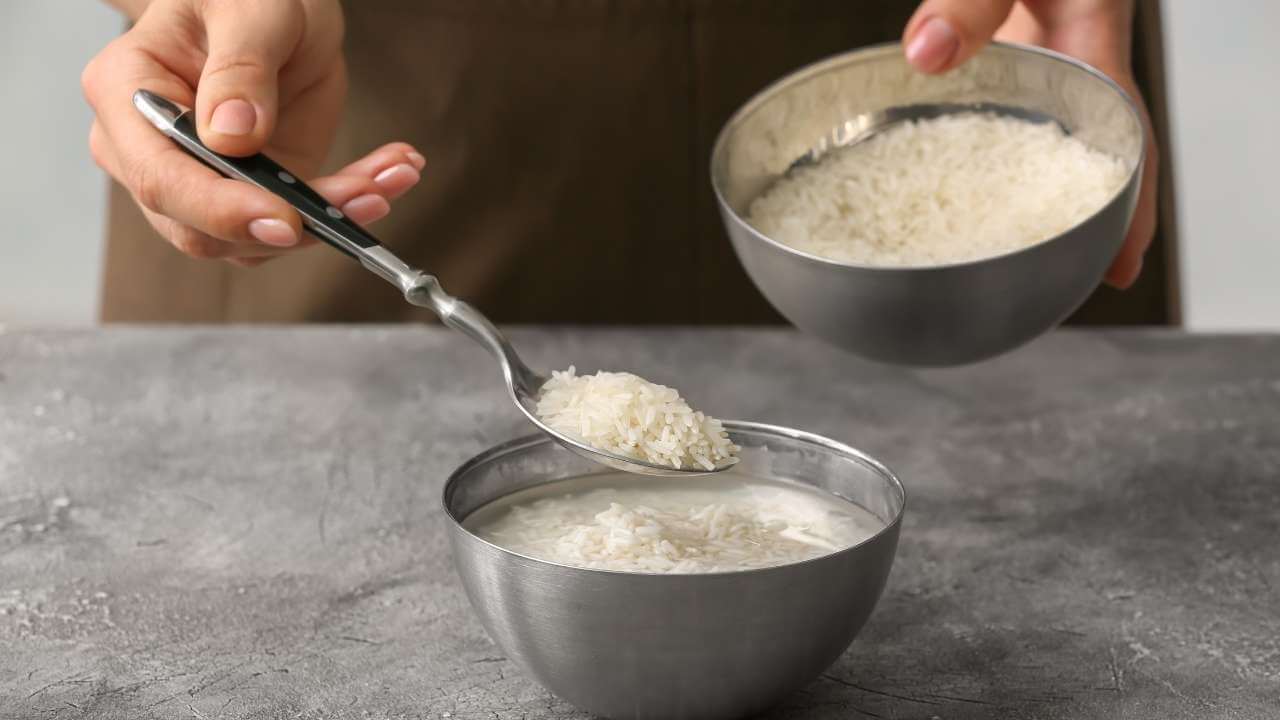
How to Prepare Rice Water at Home
Are you ready to experience the extraordinary beauty benefits of rice water? Let us guide you through how you can make fermented rice water at home.
Step 1: Washing
Begin by washing and straining uncooked rice grains to remove any potential contaminants.
Step 2: Soaking Method
Combine the strained grains with plain water, stirring until it becomes cloudy. It's also possible to boil the rice for an alternative preparation method- simply strain out the cooked grain afterward and store the leftover water in a lid-covered clean bowl!
Step 3: Store Rice Water Prepared
Let the soaked rice water ferment by leaving it at room temperature for 12-24 hours, so all beneficial nutrients are extracted. Keep any unused rice water in your fridge which can be used for up to a week after! Now your natural remedy is ready to be used.
How to Use Rice Water as a Face Toner
Enhance your skin with a nourishing blend of organic rice, aloe vera gel, and rose water! Here's how to make a homemade rice water toner.
- Gather one cup of organic rice
- Freshly squeezed aloe vera gel
- Rose water and a clean bowl
Mix the aloe vera gel and organic rice until you have reached the desired consistency, then add one tablespoon of rose water used to reduce pores on your face.
Enjoy this quick yet powerful beauty regimen that will leave you feeling radiant!
How to Use Rice Water as a Face Serum
For a nutrient-rich face serum, you'll need:
- Freshly squeezed aloe vera gel
- Rice water
- Vitamin E oil capsules
To Create the Serum:
- Mix 3 teaspoons of rice water with 1 teaspoon of aloe vera gel into an empty bottle.
- Carefully cut open two vitamin E gel capsules and add the oil to the mixture before giving it a vigorous shake - your powerful elixir is then ready to use!
Did We Mention...
Rice Water for Skin FAQs?
People are looking for information about rice water and how to use it for their skin, but they're not sure where to start.
We've put together this FAQ list with the most up-to-date and reliable information about rice water and its uses for the skin.
Our experts have answered some of the most commonly asked questions that people have about rice water, so you can start using it right away to get better-looking skin.
Q: How long should you leave rice water on your face for maximum benefits?
If you're using rice water as a DIY facial toner, it's perfectly safe to leave it on your face overnight. However, if you've combined multiple ingredients for an at-home face mask treatment, then let the mixture stay on for 15 to 30 minutes before rinsing off.
Q: Is it safe to use rice water topically on a daily basis?
Absolutely, it is safe to use rice water as a toner on your face twice daily or once if using it for a face mask. Before using rice water though, always check to make sure it doesn’t smell sour. If so, you will need to create a new batch.
Q: Are there any side effects of using rice water on the skin?
If used excessively, rice water can cause your skin to become dry, flaky, and itchy. It is not recommended for people with open wounds on their skin and those with allergies to rice should not use rice water since it could result in potential skin irritation or discomfort.
Q: What are the benefits of using rice water for dull and oily skin?
Rice water helps to brighten and even out your complexion, giving it a natural glow. In addition, some beauty experts claim it works wonders for oily or combination skin since it regulates sebum production, controlling the amount of excess oil produced on the face. While this may be true, the rice water benefits for oily skin have yet to be scientifically proven.
Q: What type of rice should I use when making starchy rice water?
It is best to use long-grain white or brown rice as they are more likely to give you the desired results. Avoid using wild and black varieties as they can contain too much starch, and if used for skin care could cause irritation or breakouts.
For best results, prepare rice water from boiling rice in plain water to ensure that it is rich in beneficial nutrients.
If you’re looking for a more concentrated solution then use equal parts of uncooked grain with double the amount of boiling water. Allow this mixture to soak overnight and you’ll have rich starchy rice water the next morning. This can be used as an effective skin toner or face mask to target various skin problems.
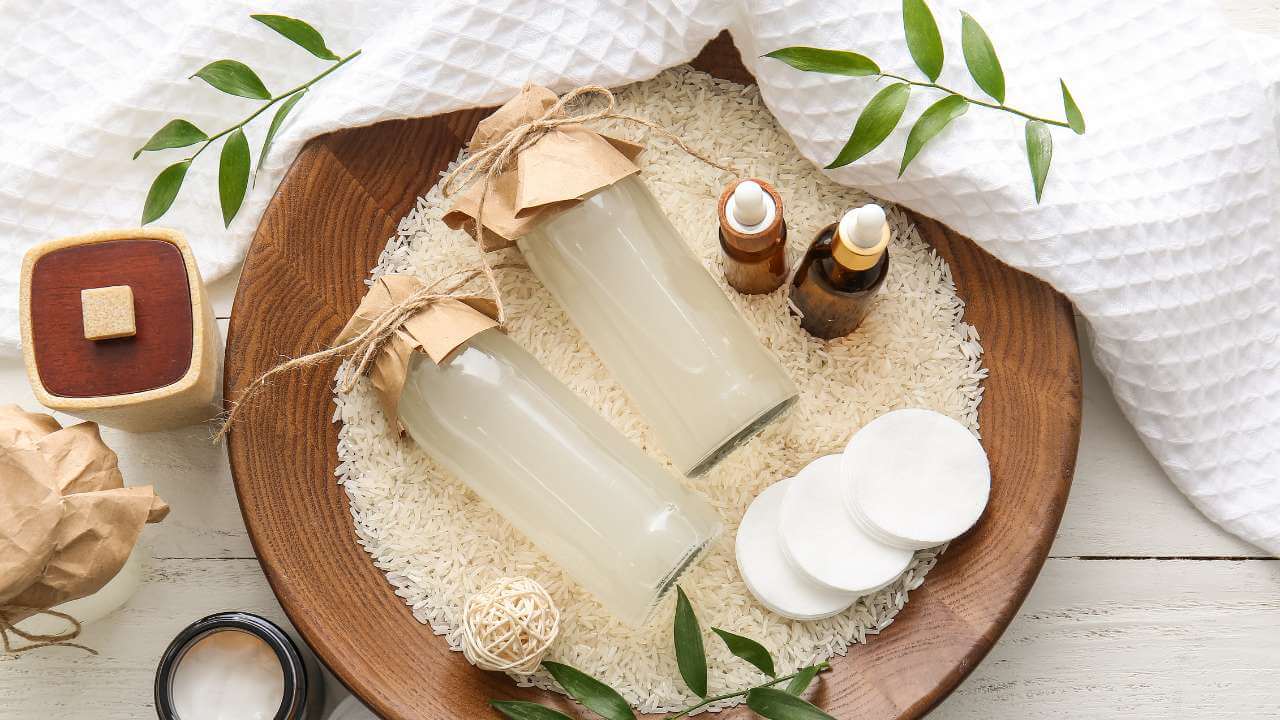
The Final Mention
In conclusion, rice water is a remarkable solution to a variety of skin concerns. Its natural ingredients work wonders on dull, itchy skin, and various other skin issues. This ancient beauty secret has been proven to be extremely beneficial, and now it's time for you to harness its power for your own skin care routine.
So, if you're looking for a cost-effective and natural way to rejuvenate your skin, look no further than rice water. Give it a try and witness the transformation firsthand. Your skin will thank you for it!
We'd love to hear about your experience with rice water. Have you tried it before, or are you planning to incorporate rice water into your skin care routine?
Share your thoughts and experiences in the comments below! Let's create a community where we can learn from each other and celebrate the power of natural skincare solutions.
✅ 4 Sources
HealthMention only uses sources from authoritative and reliable resources, such as peer-reviewed studies, to strengthen the accuracy of our content.
- Zamil DH, Khan RM, Braun TL, Nawas ZY. Dermatological uses of rice products: Trend or true? Journal of Cosmetic Dermatology. Published online June 2, 2022. doi:https://doi.org/10.1111/jocd.15099
- Binic I, Lazarevic V, Ljubenovic M, Mojsa J, Sokolovic D. Skin Ageing: Natural Weapons and Strategies. Evidence-based Complementary and Alternative Medicine : eCAM. 2013;2013. doi:https://doi.org/10.1155/2013/827248
- Marto J, Neves Â, Gonçalves L, Pinto P, Almeida C, Simões S. Rice Water: A Traditional Ingredient with Anti-Aging Efficacy. Cosmetics. 2018;5(2):26. doi:https://doi.org/10.3390/cosmetics5020026
- Paepe K de, Hachem JP, Vanpee E, Roseeuw D, Rogiers V. Effect of Rice Starch as a Bath Additive on the Barrier Function of Healthy but SLS-damaged Skin and Skin of Atopic Patients. Acta Dermato-Venereologica. 2002;82(3):184-186. doi:https://doi.org/10.1080/00015550260132460


